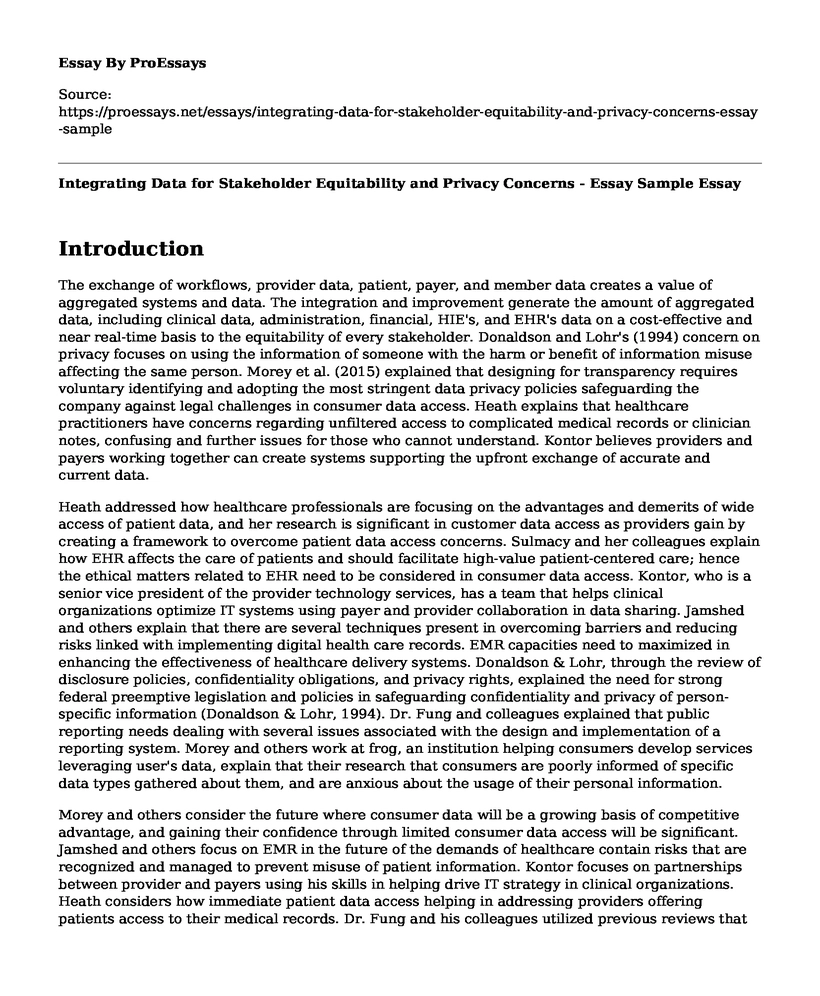Introduction
The exchange of workflows, provider data, patient, payer, and member data creates a value of aggregated systems and data. The integration and improvement generate the amount of aggregated data, including clinical data, administration, financial, HIE's, and EHR's data on a cost-effective and near real-time basis to the equitability of every stakeholder. Donaldson and Lohr's (1994) concern on privacy focuses on using the information of someone with the harm or benefit of information misuse affecting the same person. Morey et al. (2015) explained that designing for transparency requires voluntary identifying and adopting the most stringent data privacy policies safeguarding the company against legal challenges in consumer data access. Heath explains that healthcare practitioners have concerns regarding unfiltered access to complicated medical records or clinician notes, confusing and further issues for those who cannot understand. Kontor believes providers and payers working together can create systems supporting the upfront exchange of accurate and current data.
Heath addressed how healthcare professionals are focusing on the advantages and demerits of wide access of patient data, and her research is significant in customer data access as providers gain by creating a framework to overcome patient data access concerns. Sulmacy and her colleagues explain how EHR affects the care of patients and should facilitate high-value patient-centered care; hence the ethical matters related to EHR need to be considered in consumer data access. Kontor, who is a senior vice president of the provider technology services, has a team that helps clinical organizations optimize IT systems using payer and provider collaboration in data sharing. Jamshed and others explain that there are several techniques present in overcoming barriers and reducing risks linked with implementing digital health care records. EMR capacities need to maximized in enhancing the effectiveness of healthcare delivery systems. Donaldson & Lohr, through the review of disclosure policies, confidentiality obligations, and privacy rights, explained the need for strong federal preemptive legislation and policies in safeguarding confidentiality and privacy of person-specific information (Donaldson & Lohr, 1994). Dr. Fung and colleagues explained that public reporting needs dealing with several issues associated with the design and implementation of a reporting system. Morey and others work at frog, an institution helping consumers develop services leveraging user's data, explain that their research that consumers are poorly informed of specific data types gathered about them, and are anxious about the usage of their personal information.
Morey and others consider the future where consumer data will be a growing basis of competitive advantage, and gaining their confidence through limited consumer data access will be significant. Jamshed and others focus on EMR in the future of the demands of healthcare contain risks that are recognized and managed to prevent misuse of patient information. Kontor focuses on partnerships between provider and payers using his skills in helping drive IT strategy in clinical organizations. Heath considers how immediate patient data access helping in addressing providers offering patients access to their medical records. Dr. Fung and his colleagues utilized previous reviews that provide inconsistent information on the influence of publicly reported performance data in building their analysis. Sulmasy and colleagues address ethical implications that are crucial in matters dealing with consumer data access. Donaldson & Lohr's identification of costs effective care providers to improve healthcare motivated the creation and maintenance of a population-based and comprehensive database.
As a health care manager, developing strategies that deal with the issues associated with patient data access is crucial in ensuring an effective way of using patient-specific information. Ultimately, the different arguments dealing with the importance of customer data access and ethical considerations on the matter are highly significant in regulating disclosure of patient information.
References
Donaldson, M. S., & Lohr, K. N. (1994). Health Databases and Health Database Organizations: Uses, Benefits, and Concerns. Institute of Medicine (US) Committee on Regional Health Data Networks. https://www.ncbi.nlm.nih.gov/books/NBK236547/pdf/Bookshelf_NBK236547.pdf
Fung, C. H., Lim, Y. W., Mattke, S., Damberg, C., & Shekelle, P. G. (2008). Systematic Review: The Evidence That Publishing Patient Care Performance Data Improves Quality of Care. Annals of Internal Medicine, 148, 111-123.
Heath, S. (2017, August 10). 4 pros and cons of digital patient health data access. PatientEngagementHIT. https://patientengagementhit.com/news/4-pros-and-cons-of-digital-patient-health-data-access
Jamshed, N., Ozair, F., Sharma, A., & Aggarwal, P. (2015). Ethical issues in electronic health records: A general overview. Perspectives in Clinical Research, 6(2), 73. https://doi.org/10.4103/2229-3485.153997
Kontor, J. (2019, March 18). Three steps to better data-sharing for Payer and provider CIOs. Modern Healthcare. https://www.modernhealthcare.com/opinion-editorial/three-steps-better-data-sharing-payer-and-provider-cios
Morey, T., Forbath, T. T., & Schoop, A. (2015, May 1). Customer data: Designing for transparency and trust. Harvard Business Review. https://hbr.org/2015/05/customer-data-designing-for-transparency-and-trust
Sulmasy, L. S., López, A. M., & Horwitch, C. A. (2017). Ethical implications of the electronic health record: In the service of the patient. Journal of General Internal Medicine, 32(8), 935-939. https://doi.org/10.1007/s11606-017-4030-1
Cite this page
Integrating Data for Stakeholder Equitability and Privacy Concerns - Essay Sample. (2023, Aug 16). Retrieved from https://proessays.net/essays/integrating-data-for-stakeholder-equitability-and-privacy-concerns-essay-sample
If you are the original author of this essay and no longer wish to have it published on the ProEssays website, please click below to request its removal:
- Questions on Management Concepts
- Essay Example on Management of Hospitals
- Strategic Communication in Project Management Paper Example
- Importance of CEO Reputation Essay
- Group Decision-Making Methods Paper Example
- Essay Example on Herb Kelleher: Charismatic Leader in Aerospace Industry
- Toy Company Expansion: Identifying an Ideal Model for Decision Making - Essay Sample







